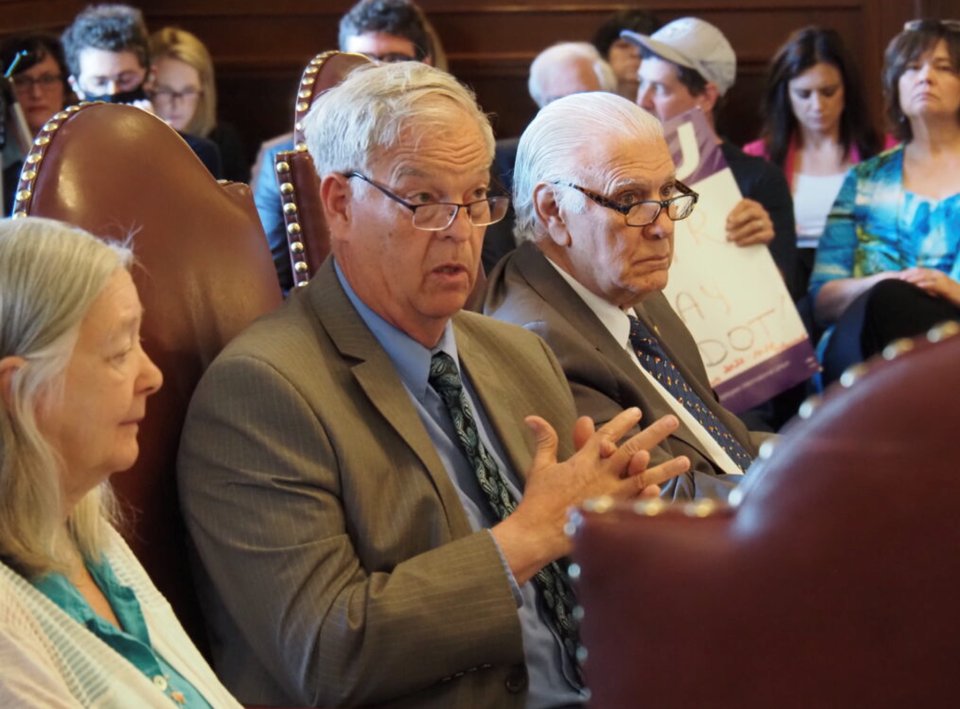GOP executive councilors hold up funding for after-school sex ed they approved in prior years

Three Executive Council Republicans have for a second time paused funding for a long-standing after-school sexual health education program for at-risk adolescents in Manchester and Sullivan County, areas with the highest teen pregnancy rates in the state.
Patricia Tilley, director of the Division of Public Health Services, told councilors Tuesday the program to be provided by Amoskeag Health in Manchester and the TLC Family Resource Center in Claremont to an estimated 975 teens in the next three years will end without funding. She said this is the first time the funding has been challenged in the 10 years it has come before the Executive Council.
The Get Real curriculum, which was developed by Planned Parenthood League of Massachusetts but delivered by the two community health providers, requires parental permission and encourages ongoing parental involvement, Tilley told councilors. The three Republicans who voted to halt the funding, Joe Kenney, David Wheeler, and Ted Gatsas, have previously approved it, according to Executive Council records.
In interviews, Kenney and Wheeler said they do not recall voting for the funding in the past.
Both said they have concerns about parents’ involvement after they give permission for their child to participate. Reading from the high school curriculum, Wheeler quoted its definition of confidentiality: “Confidentiality means that personal information will not be shared outside the classroom with students, parents, other teachers.”
Wheeler said he also opposes the program’s definition of abstinence and what he feels is a permissive view of minors engaged in sexual activity.
“It’s only abstaining from anything that can get you pregnant,” Wheeler said. “They are not saying you should abstain from oral sex, anal sex, girl on girl, or boy on boy. This needs to be combined with informed consent. The parent needs to know that they are teaching that you can have sex whether you are ready or not and we’re not going to tell the parents.”
The Get Real program is separate from sexual health education courses taught in public schools to all students except those whose parents ask that their child be opted out. (Schools must give parents at least two weeks’ notice and “to the extent possible” make the curriculum available for review under legislation signed by Gov. Chris Sununu in 2017.)
Wheeler, Kenney, and Gatsas did not share their concerns when they tabled funding at the council’s Sept. 21 meeting or on Tuesday, when they voted against taking the funding off the table. Democratic Councilor Cinde Warmington and Republican Councilor Janet Stevens were alone in voting to take up the funding Tuesday.
'Fact-finding mission'
In an interview following Tuesday’s vote, Kenney said he needs more assurance that the program requires parental permission and wants a better understanding of the curriculum.
“We are on a fact-finding mission here,” Kenney said. “Whatever it is that we are doing, are the parents OK with it? If they are not, I’m going to have problems with it.”
Kenney also said he was mindful of parental concerns about children being “oversexualized” in school.
When asked how he would gauge parents’ opinions, Kenney said, “You look at material and say to yourself, ‘Is this something parents want their children being exposed to, or is this something parents themselves should be doing?’”

Wheeler said he has received only the 177-page high school curriculum and the accompanying teachers’ guide and student workbook. He has also requested that the Department of Health and Human Services send him the middle school curriculum. He said he has seen enough, however, to be concerned. Among those concerns is a cartoon in a separate resource website that is recommended within the Get Real program. It depicts a bedroom scene, Wheeler said, accompanied by a quote that says, “It doesn’t matter how many partners you have.”
Wheeler said, “I think most parents would say, most community values would say, that’s not OK for high school students.” He said he does not believe minors should be having sex without first talking with their parents.
The website Wheeler cited, however, also encourages people to limit their number of partners. “If you are going to have sex, have it with just one person and ask about his or her sexual history,” it says. “The fewer partners you have, the less chance you will get an STI.”
'Critical and long-standing'
When asked for a copy of the curriculum, the Department of Health and Human Services referred the Bulletin to the Get Real website, which describes the program’s content but does not provide the curriculum. Amoskeag Health and the TLC Family Resource Center in Claremont did not respond to requests for comment.
Kristine Stoddard, senior director of New Hampshire public policy for Bi-State Primary Care Association, said the program includes critical education that goes beyond sexual health education and failing to fund it would put at-risk teens further at risk.
“We are very concerned by the Executive Council’s delaying approval of contracts that fund critical and long-standing health care programs that impact thousands of families in need. The goal of the grant funding … is to decrease the number of teen births and sexually transmitted infections by providing adolescents with a medically accurate, evidence-based sexual education. This includes information on healthy relationships, adolescent development, and life skills.”
She added, “Manchester and Claremont have the highest teen birth rates in New Hampshire. Delaying federal funding to trusted health care organizations serving these communities will undoubtedly exacerbate these already high rates of STIs and teen births in our state.”

The program is aimed at lowering teen pregnancy and sexually transmitted diseases and is typically taught outside school hours. It covers abstinence, the reproductive process, sexually transmitted diseases, and contraception, Tilley said. According to Get Real’s website, its curriculum aligns with the National Sexuality Education Standards on additional topics related to understanding gender identity and expression, and relationship and decision-making skills.
“It always leads with abstinence,” Tilley said. “The best way to prevent a pregnancy or sexually transmitted infection is to not have sex, and that is really the primary focus. However, they do provide a comprehensive education of what I refer to sometimes as the birds and the bees: what your body parts are, what they do, and also what contraception is.”
The program has been part of the federal Department of Health and Human Services “evidence-based” curriculum since at least 2015.
'Social and economic impact'
Anti-abortion groups across the country have challenged the program in recent years over its connection to Planned Parenthood, sometimes succeeding in eliminating funding.
The $682,000 in federal funding would allow Amoskeag Health and the TLC Family Resource Center to continue offering the “Personal Responsibility Education Program” to people up to age 19 and pregnant or parenting people up to age 21. The program targets at-risk youth, including those living in homeless shelters and foster care and who have been victims of human trafficking.
Research has shown that increased funding for sexual education programs has led to lower teen birth rates nationally. Another study found “strong support” among Republicans and Democrats for sexual education for middle and high school students.

The state’s teen pregnancy rate has dropped significantly since 2007, from 19 per 1,000 teens to 5.4 in 2021, according to the Department of Health and Human Services. But the numbers are much higher in Manchester and Sullivan County, at 18 and nearly 14 per 1,000, respectively.
“New Hampshire has a pretty low birth rate. We’re usually number one or two for the least number of teen births in the country,” Tilley told councilors. “We know with teen pregnancies, the outcomes are poor. Babies tend to be low birth weight (and) they can be often born premature. We know there is a social and economic impact both for the mother and the child. Families are more likely to live in poverty (and) not have the educational opportunities that we want for all families.”
Wheeler, Kenney, and Gatsas did not reference the program’s connection to Planned Parenthood at this week’s meeting. But they and Stevens have repeatedly rejected family reproductive health contracts with Planned Parenthood of Northern New England, as well as Lovering Health Center and Equality Health Center, saying they don’t want public funding used for abortion.
The Department of Health and Human Services and Attorney General John Formella have told councilors that state audits confirmed they were using only private money for those services.
Warmington and four Democrats she helped recruit to challenge the council’s Republicans have made GOP rejections of reproductive health funding a key campaign issue.
“This program is intended to help our most vulnerable teenagers in the two parts of the state where we see the highest rates of teen pregnancy, but the three men on the council didn’t even want to discuss it,” Warmington said in a statement Wednesday. “If someone wants to reduce rates of sexually transmitted diseases, teenage pregnancy, and abortion, then they would be in support of this program.”
Claims of sexualization
Conservative lawmakers and anti-abortion advocates have also highlighted their opposition to abortion and, more recently, what they see as the sexualization of children by schools.
In an email Sunday, Cornerstone Action, a leading voice against abortion, urged its supporters to ask executive councilors to reject funding for the sexual education program. In its initial email, the group incorrectly said the funding would go to Planned Parenthood. The group corrected that in a second email but still linked Planned Parenthood to the program.
Cornerstone Action wrote that any description of Get Real’s curriculum as age-appropriate and supportive of abstinence and parental involvement is “disingenuous.” The group also seemed to question the requirement for parental permission.
“The clear message of the Get Real program is a not-so-subtle undermining of parental rights in its positioning of Planned Parenthood and schools as parental figures responsible for determining how our children will be taught about sex and sexuality,” Cornerstone wrote.
Shannon McGinley, executive director of Cornerstone Action, did not return a message seeking comment.
Allegations of sexualizing children in school surfaced this year when Republicans defended a parental rights bill requiring schools to notify parents if their child requests to be referred to by a different name or pronoun.
This story was produced by the editorially independent New Hampshire Bulletin, which is part of States Newsroom. Contact Editor Dana Wormald for questions: info@newhampshirebulletin.com.
